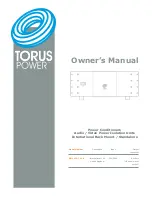
•
80-95% Stator earth fault protection (measured or calculated 3Vo) (59GN)
•
Rotor earth fault protection (with external COMBIFLEX RXTTE4 injection
unit) (64F)
•
Underimpedance protection (21)
•
Voltage Controlled/Restrained Overcurrent protection (51C, 51V)
•
Turn-to-Turn & Differential Backup protection (directional Negative
Sequence. Overcurrent protection connected to generator HV terminal CTs
looking into generator) (67Q)
•
Stator Overload protection (49S)
•
Rotor Overload protection (49R)
•
Loss of Excitation protection (directional pos. seq. OC protection) (40)
•
Reverse power/Low forward power protection (directional pos. seq. OC
protection, 2% sensitivity) (32)
•
Dead-Machine/Inadvertent-Energizing protection (51/27)
•
Breaker head flashover protection
•
Improper synchronizing detection
•
Sensitive negative sequence generator over current protection and alarm (46)
•
Phase or phase-to-phase or Negative/Positive/Zero Sequence over/under
voltage protection (27x, 59x, 47)
•
Generator out-of-step detection (based on directional pos. seq. OC) (78)
•
Inadvertent generator energizing
10.1.2.4
Inadvertent generator energization
SEMOD151947-4 v2
When the generator is taken out of service, and stand-still, there is a risk that the
generator circuit breaker is closed by mistake.
Three-phase energizing of a generator, which is at standstill or on turning gear, causes
it to behave and accelerate similarly to an induction motor. The machine, at this point,
essentially represents the subtransient reactance to the system and it can be expected to
draw from one to four per unit current, depending on the equivalent system impedance.
Machine terminal voltage can range from 20% to 70% of rated voltage, again,
depending on the system equivalent impedance (including the block transformer).
Higher quantities of machine current and voltage (3 to 4 per unit current and 50% to
70% rated voltage) can be expected if the generator is connected to a strong system.
Lower current and voltage values (1 to 2 per unit current and 20% to 40% rated
voltage) are representative of weaker systems.
Since a generator behaves similarly to an induction motor, high currents will develop
in the rotor during the period it is accelerating. Although the rotor may be thermally
damaged from excessive high currents, the time to damage will be on the order of a
few seconds. Of more critical concern, however, is the bearing, which can be damaged
in a fraction of a second due to low oil pressure. Therefore, it is essential that high
speed tripping is provided. This tripping should be almost instantaneous (< 100 ms).
Section 10
1MRK 505 370-UUS A
Multipurpose protection
272
Busbar protection REB670 2.2 ANSI
Application manual
Summary of Contents for RELION REB670
Page 1: ...RELION 670 SERIES Busbar protection REB670 Version 2 2 ANSI Application manual ...
Page 2: ......
Page 24: ...18 ...
Page 40: ...34 ...
Page 72: ...66 ...
Page 102: ...96 ...
Page 266: ...260 ...
Page 272: ...266 ...
Page 290: ...284 ...
Page 432: ...426 ...
Page 542: ...536 ...
Page 552: ...546 ...
Page 553: ...547 ...












































